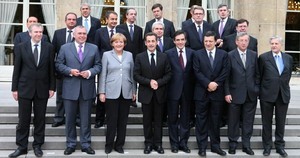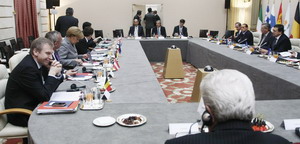This afternoon, the Prime Minister of the Republic of Slovenia, Janez Janša, attended the extraordinary summit of the fifteen eurozone countries, held in Paris with a view to producing a concerted and coordinated plan to tackle the worsening global financial crisis. Following the meeting at the Élysée Palace, Prime Minister Janez Janša stressed that despite the fact that Slovenian banks had not been hit by bad investments, action should be taken immediately in order to prevent the crisis from severely affecting savings deposits and jobs. From this standpoint, Slovenia will take action on the basis of today’s coordinated plan, aimed at helping banks and other financial institutions tackle the crisis of liquidity and solvency, and at guaranteeing lending between them as soon as possible.

(Photo: Didier Noizet)
At the meeting, the Heads of State and Government of the Eurogroup countries agreed on a joint pledge, which is part action plan and part guideline, on battling the effects of the global financial crisis. “The situation varies greatly from country to country, and each country takes action based on its position. Even for the largest European countries, clear figures about the size of the bail-out for banks and other financial institutions are not yet known,” stressed the Slovenian Prime Minister. “Nothing has been mentioned about the overall sum required to implement these measures. All eurozone governments have taken a decision to help financial institutions in their countries in every possible way permitted by the European and national rules of the game. And they have done so to prevent these institutions from collapsing, revitalise the financial market and encourage inter-bank lending, which is of vital importance to the success of the economy.”

Prime Minister Janez Janša and his Portuguese colleague Prime Minister José Sócrates (Photo: Slana/Bobo)
The crisis measures to tackle the unprecedented situation are limited and due to expire at the end of next year, cautioned Prime Minister Janša. These measures, however, including special assistance to small and medium-sized enterprises, which have been affected most by the current banking crisis, should not be mistaken for the normal regulation which must be put in place in order for the European internal market to function properly. This is the only way the European Union will be able to continue to implement the Lisbon Strategy for growth and jobs.
“Many of us have stressed that the financial system is in crisis and that this is a global crisis – like pneumonia, which requires effective antibiotics. However, we cannot imagine taking antibiotics one after another for the next five years,” PM Janez Janša asserted.

(Photo: Bor Slana/Bobo)
Prime Minister Janša stated that, on Tuesday, the Government of the Republic of Slovenia would discuss the amended law governing banking. “We need this law to guarantee savings deposits, and it is very likely that we will also adopt or propose several additional measures given the set of measures contained in the action plan and guidelines agreed today.” He went on to add that these decisions should not require any additional resources in relation to guarantees, since on Wednesday Slovenia decided to lift the EUR 22,000 state guarantee limit on deposits and introduce an unlimited guarantee on bank and savings deposits. This will apply to natural persons and to micro and small enterprises in Slovenian banks until the crisis ends. “Slovenian banks have not been hit by bad investments, which are a major problem facing European and American financial institutions, and the root cause of the financial crisis,” explained the Prime Minister. He cautioned that funds in which many people had invested their savings may also encounter problems, the extent of which, however, could not yet be estimated. “According to unofficial information, the amount in question is between EUR 1 billion and EUR 2 billion,” said PM Janez Janša. He added that their relative solvency should still be estimated and more relevant information obtained.

Prime Minister Janša, Luxembourg Prime Minister and President of the Eurogroup Jean-Claude Juncker (in the background), the host – French President and current President of the European Council Nicholas Sarkozy, and President of the European Commission José Manuel Barroso (Photo: Bor Slana/Bobo)
Prime Minister Janša also drew attention to the impact of the financial crisis on the real economy, which, in Slovenia, is felt mainly by small and medium-sized enterprises. “If there is no lending between banks and no medium- and long-term loans for the normal functioning of the economy, we are approaching a meltdown which particularly affects small and medium-sized enterprises.” In his opinion, the consequence of all this can be a reduction in demand leading to a declining overall need for products, which results in higher unemployment and less purchasing power within the economy. This can, in turn, influence demand itself and thus economic conditions. “Consequently, the European, world and Slovenian economies may be drawn into a vicious circle with no way out in the short run,” concluded the Slovenian Prime Minister.